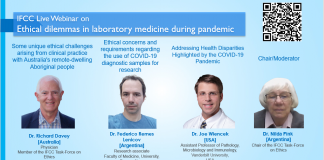A case of extremely low HbA1c results was reported, in which liver cirrhosis, subacute hemorrhage and recent transfusion all contributed to the low result. This case illustrates when HbA1c should not be used as a clinically relevant diabetes marker. However, low or extremely low HbA1c (<5.0% or <4.0%) may occur in apparently healthy individuals. When this occurs, it is an independent risk factor associated with liver diseases, hospitalization, and all-cause mortality. From the clinical laboratory perspective, the clinical cause of extremely low HbA1c should be determined, and suggestions of different test utilization or increased health surveillance should be given to care providers.
Ping Wang, PhD, DABCC, FACB; What Clinical Laboratorians Should Do in Response to Extremely Low Hemoglobin A1c Results. Lab Med 2017; 48 (1): 89-92. doi: 10.1093/labmed/lmw050
Source: Lab Medicine Oxford Academic











